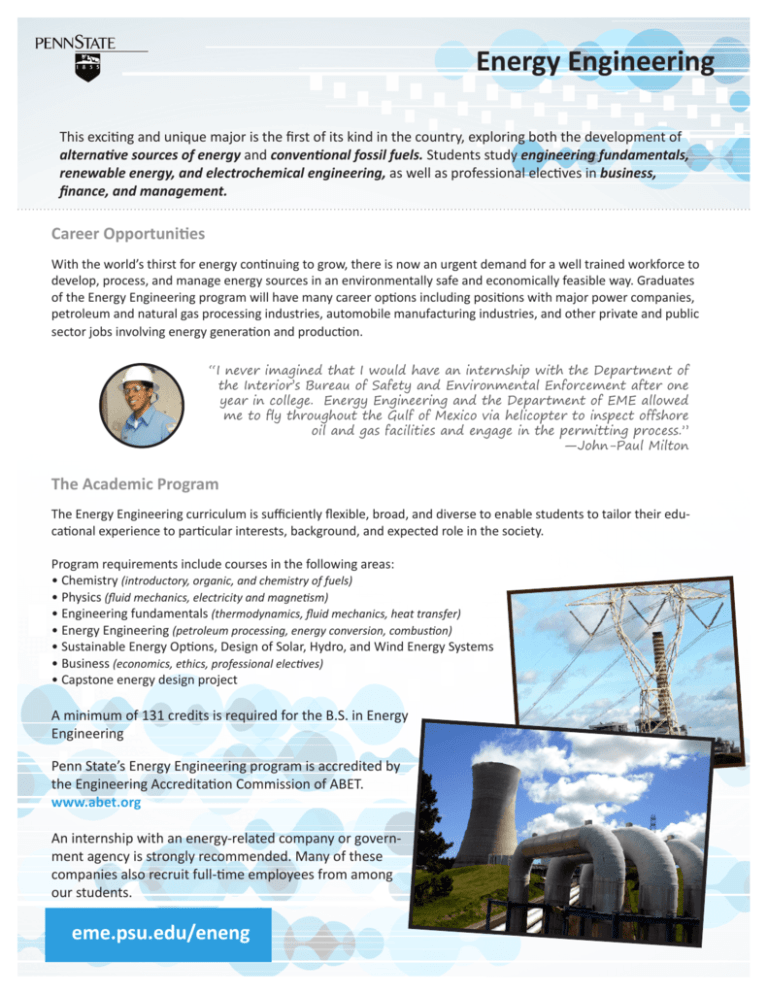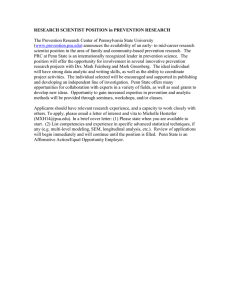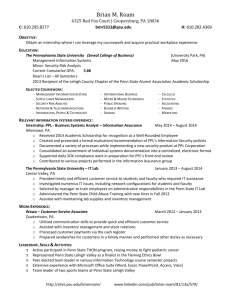Energy Engineering - College of Earth and Mineral Sciences
advertisement

Energy Engineering This exciting and unique major is the first of its kind in the country, exploring both the development of alternative sources of energy and conventional fossil fuels. Students study engineering fundamentals, renewable energy, and electrochemical engineering, as well as professional electives in business, finance, and management. Career Opportunities With the world’s thirst for energy continuing to grow, there is now an urgent demand for a well trained workforce to develop, process, and manage energy sources in an environmentally safe and economically feasible way. Graduates of the Energy Engineering program will have many career options including positions with major power companies, petroleum and natural gas processing industries, automobile manufacturing industries, and other private and public sector jobs involving energy generation and production. “I never imagined that I would have an internship with the Department of the Interior’s Bureau of Safety and Environmental Enforcement after one year in college. Energy Engineering and the Department of EME allowed me to fly throughout the Gulf of Mexico via helicopter to inspect offshore oil and gas facilities and engage in the permitting process.” —John-Paul Milton The Academic Program The Energy Engineering curriculum is sufficiently flexible, broad, and diverse to enable students to tailor their educational experience to particular interests, background, and expected role in the society. Program requirements include courses in the following areas: • Chemistry (introductory, organic, and chemistry of fuels) • Physics (fluid mechanics, electricity and magnetism) • Engineering fundamentals (thermodynamics, fluid mechanics, heat transfer) • Energy Engineering (petroleum processing, energy conversion, combustion) • Sustainable Energy Options, Design of Solar, Hydro, and Wind Energy Systems • Business (economics, ethics, professional electives) • Capstone energy design project A minimum of 131 credits is required for the B.S. in Energy Engineering Penn State’s Energy Engineering program is accredited by the Engineering Accreditation Commission of ABET. www.abet.org An internship with an energy-related company or government agency is strongly recommended. Many of these companies also recruit full-time employees from among our students. eme.psu.edu/eneng Research Research areas include clean coal and fuel technologies, hydrogen storage and fuel cells, carbon sequestration, biofuels, carbon materials from fossil fuels, sustainable energy options, and energy policy and economics. Students in the Energy Engineering program have several research opportunities available through the EMS Energy Institute, including the option to apply for an undergraduate research grant. “Going into Energy Engineering I had dreams of saving and changing the world one type of energy at a time. Penn State and EMS has done a great job of catering to my passion in this industry and giving me a real world perspective of how I can make the biggest impact. What I’ve learned in these last two and a half years in this major is that it won’t be easy, but it will be fulfilling and worth it in the end.” - Ian Wolfe Scholarships The Energy Engineering program has limited scholarship funds, which are awarded on the basis of academic achievement and merit. Students are also eligible for numerous scholarships through the University and the College of Earth and Mineral Sciences. For More Information: Dr. Sarma Pisupati Program Officer, Energy Engineering John and Willie Leone Family Department of Energy and Mineral Engineering The Pennsylvania State University 126B Hosler Building University Park, PA 16802-5000 814-865-0874 spisupati@psu.edu eme.psu.edu/eneng Penn State is committed to affirmative action, equal opportunity, and the diversity of its workforce. U.Ed. EMS 13-43.











